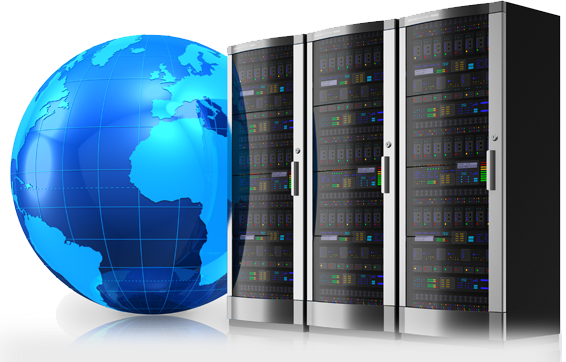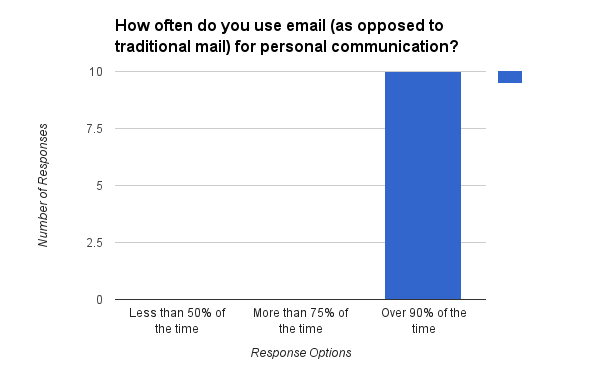
Effects and Impacts
B. Explain a benefit and/or harmful effect of the innovation.
 The benefit of email is that it provides people with standard, archived, one-to-many electronic communication. Standard means that it is based on an international standard, SMTP [2], so that email send from any email client application in any language anywhere in the world will be delivered to any other email client. Archived means that email naturally saved by email servers and email clients for later use in a way that is typically more organized and robust than other forms of electronic communcation, like texting and instant messages. One-to-many means that email is designed to be delivered from one sender to many recipients - again more naturally than text and messaging applications support. It is faster, less expensive, more convenient than traditional mail delivery. It also delivers electronic documents.
The benefit of email is that it provides people with standard, archived, one-to-many electronic communication. Standard means that it is based on an international standard, SMTP [2], so that email send from any email client application in any language anywhere in the world will be delivered to any other email client. Archived means that email naturally saved by email servers and email clients for later use in a way that is typically more organized and robust than other forms of electronic communcation, like texting and instant messages. One-to-many means that email is designed to be delivered from one sender to many recipients - again more naturally than text and messaging applications support. It is faster, less expensive, more convenient than traditional mail delivery. It also delivers electronic documents.
 One harmful effect of email is the ease at which it can be mis-used in ways such as spamming. Spamming can harm communication by clouding worthy communication with a vast amount of unwanted communication [3]. The chart on the left shows the spam attempted delivery to the account of an employee at a major U.S. company. A second harmful impact can be on personal privacy because due to the fact that email is naturally archived, private communication can be available for others who may gain access to the email (see detail in my answer to Question H).
One harmful effect of email is the ease at which it can be mis-used in ways such as spamming. Spamming can harm communication by clouding worthy communication with a vast amount of unwanted communication [3]. The chart on the left shows the spam attempted delivery to the account of an employee at a major U.S. company. A second harmful impact can be on personal privacy because due to the fact that email is naturally archived, private communication can be available for others who may gain access to the email (see detail in my answer to Question H).
C. Explain the impact that the innovation has had on society, economy, and/or culture.

Email has had a profound impact on society through how humans communicate. It has drastically reduced the use of tradional mail. For instance, many people have all bills and payments that used to be delivered through tradional mail now delivered "paperlessly" through email. People rarely write letters to each other, instead choosing to send an email message. A 2013 study concluded that email has achieved 92% replacement of written letters as a means of personal communication [4]. I polled 10 college students asking what percentage of personal communication they do with email vs. traditioanl mail. The results are shown in the figure to the right - all of those polled said that over 90% of their personal communication is by email over traditional mail. The access to quick one-to-many delivery has increased the amount of personal communication people have as compared to the era immediately preceeding the wide-spread use of email [4]. The impact is even more profound in underdeveloped areas where people are more likely to communicate with government agencies when thry have email than if they only have access to regular mail [5].
In my video shown here I show a person discussing the impact of email from their point of view.
D. Indicate one field, other than computer science, which this innovation has impacted or has the potential to impact. Describe the impact.
 The field I chose is the general business workplace.
The field I chose is the general business workplace.
Email serves as an effective way to communicate with colleagues or customers. Trying to connect with a phone call or meeting requires all parties to schedule the communication whereas asynchronous email that can be sent and received when the parites can do it, makes it more likely that communication will occur. Email is recorded, so that there is a record of business communication. The time employees save via quick one-to-many communication, over the old-fashioned written intra-office memo, has significantly improved productivity [6].
A drawback of rampant growth in email has been less use of more personalized communication. Sales and service employees can overuse email in contacting prospective clients and sending confirmation and thank you emails. Work group members often prefer to sit at their desks and send emails rather than walking across the office to interact personally with a co-worker. Sending an email eliminates the opportunity for immediate feedback, including nonverbal responses, from the recipient. Overuse of email decreases internal and external rapport and may reduce effectiveness in communication. mail overload is a growing problem for many workers. Employees are sometimes so overwhelmed with catching up on email, they neglect other critical job duties. [6].